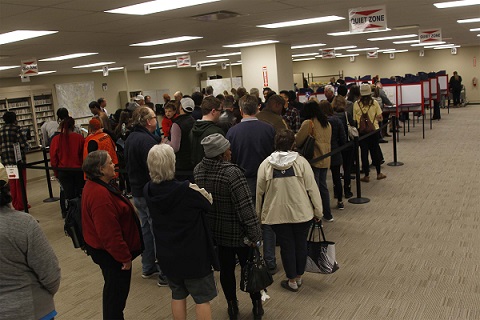The barriers to democratic leadership

Voters stand in line inside of the Board of Education on Nov. 2, 2018 to early vote in Cincinnati, Ohio. (Ernest Coleman/Zuma Press/TNS)
November 4, 2018
We’re just a few days away from one of the most important midterm elections in American history. Many in the media, and on both the left and the right, are convinced that a “blue wave” will hit the United States on November 6, that the Democrats will take over both the House and the Senate, and that Trump will surely be defeated in 2020. However, I am unconvinced that this “blue wave” is truly inevitable, not just because of uninspiring Democratic Congressional leadership, forms of voter suppression (such as gerrymandering), or Russian interference, but also because of the complacency so many across the country still feel. The Trump administration and the Republican Party have taken healthcare coverage from millions, eliminated regulations that protect the environment, drastically lowered taxes on the wealthiest people in the country (while raising them on the middle class), defended Nazis, attempted to impede the Mueller investigation, supported Russian dictator Vladimir Putin over United States intelligence agencies, and confirmed two far-right justices to be on the Supreme Court, one practically stolen. Nevertheless, many voters do not feel a sense of disgust at these actions, nor the urgency needed to address and fix these problems. Complacency is the Democrats’ greatest enemy, and the Republicans’ greatest asset. Our current political system benefits the Republicans, and that is something the Democrats need to be aware of as we quickly approach the midterms.
Republicans are willing to hamper voter turnout in order to keep themselves in office. It is for this reason that when Republicans take over state legislatures and Governors’ mansions, they redraw districts, making it easier for Republicans to win elections in those districts. (While Democrats have also been guilty of this redistricting, recent Republican control of state legislatures has given them a greater advantage from it – calculations from nonpartisan analytical organizations show that Democrats would have to win the popular vote by 7-11% to attain a majority in the House.) The same goes for voter ID laws, which exist in Republican states to prevent minorities and the poor from voting, as they usually vote Democrat. According to a May, 2017 article in The Nation, voter ID laws in Wisconsin and other states contributed to the low turnout of minorities in the 2016 election by suppressing the vote of African Americans and voters that leaned Democratic. The article goes on to state that a survey conducted by Priorities USA found that, “Wisconsin’s voter-ID law reduced turnout by 200,000 votes… Donald Trump won the state by only 22,748 votes.” Restrictive voter ID laws in Wisconsin and other states are being used by politicians to determine which voters can be involved in the political process. These laws prevented African Americans and Democrats from voting, skewing the results of a Presidential election. Republicans use the threat of “voter fraud,” which is extremely rare in the United States, to justify these devious and racist laws. One recent Republican attempt to suppress voters occurred in the Georgia Governor’s race. According to a report conducted by The Associated Press, Republican Brian Kemp (current Georgia Secretary of State) attempted to block 53,000 voter applicants from registering, the majority of whom were African American citizens (who disproportionately vote Democrat). The Georgia Secretary of State, who manages state elections, is intentionally rigging an election in which his name is on the ballot. Not only is this conflict of interest, an example of blatant corruption, and a possible violation of the law, it is also disrespectful to the voters and at odds with the very idea of a government of, by, and for the people.
Another systematic barrier to Democratic leadership is the Electoral College. As opposed to having an election decided by the popular vote, which would allow for one person to have one vote, we have the Electoral College, giving smaller states in the country, which generally vote Republican, disproportionate power over election results. In a Presidential election, a voter in Wyoming, the least populated state, has three times more voting power than a voter in California, the most populated state. The number of electoral votes a candidate allocates is not consistent with the popular vote, as was evident in the 2016 election. This is not the first time the losing candidate won the Presidency. In 1824, John Quincy Adams lost both the popular vote and the electoral vote to Andrew Jackson, but because neither one of them had an outright majority in the Electoral College, the Presidential election went to the House of Representatives, who voted for John Quincy Adams. In 1876, Rutherford B. Hayes lost the popular vote by over 250,000 votes to Samuel J. Tilden. In 1888, Benjamin Harrison lost the popular vote by over 90,000 votes to Grover Cleveland. In 2000, George W. Bush lost the popular vote by around 540,000 votes to Al Gore. And most recently, Donald Trump lost the popular vote to Hillary Clinton by a whopping 2.9 million votes. The Electoral College is an outdated institution that inaccurately represents the will of the American people. However, the Republicans are willing to keep it around for the same reason they are willing to suppress voters: because it benefits them.
Lastly, we have to account for Russian interference in our democratic processes. All seventeen of our intelligence agencies agree that the Russians’ hacking tampered with election results. They did not hack into actual voting machines – rather, they created fake accounts on social media to spread bogus conspiracy theories that seemed reasonable to some swing voters. In an exchange with the House Foreign Affairs Committee in May of 2018, Secretary of State Mike Pompeo said of attempts to prevent Russian election interference, “I have to say there is more work to do… We have not been able to achieve deterrence of some of these efforts of the Russians.” He went on to praise the Trump administration’s efforts to protect the US against election interference. Nevertheless, it is still concerning. While Russian interference is not the most significant barrier to Democratic victories, it is still intended to create chaos and division among the American people. Russian interference is an overt attack on our country’s democracy, and it is important to be vigilant.
Given the lack of voting accessibility for minorities and the poor, combined with an often rigged system of voting in many states and possible Russian interference in the election, it is easy to become discouraged, to become complacent, and to think that your vote or your voice doesn’t matter. However, when citizens are complacent and choose not to become actively involved in the political process, the corrupt and the Russians have the advantage, and their attempts to suppress the vote win. As former Secretary of the Treasury William E. Simon wisely said: “bad politicians are sent to Washington by good people who don’t vote.”




